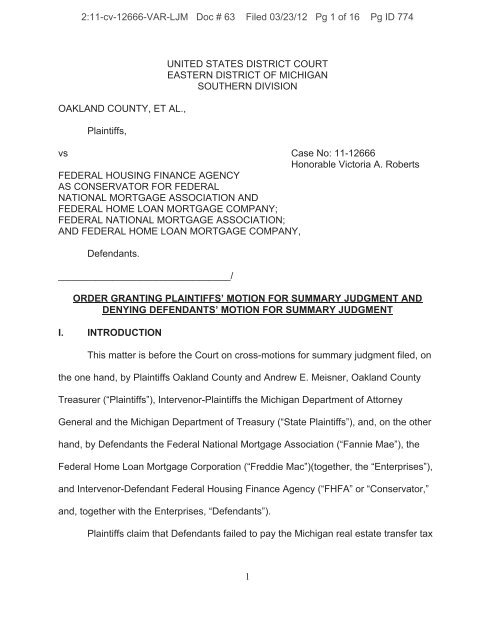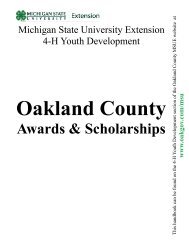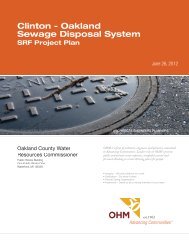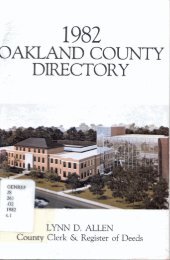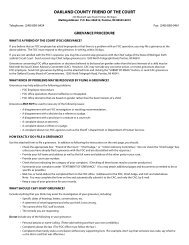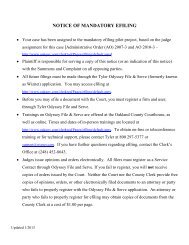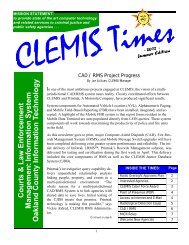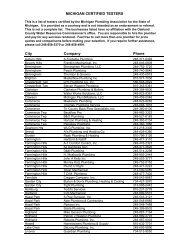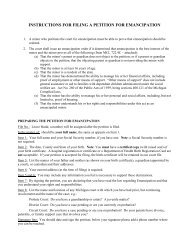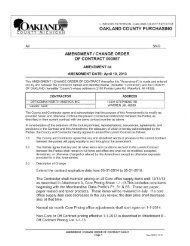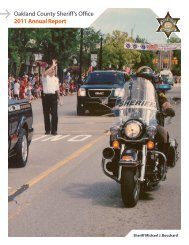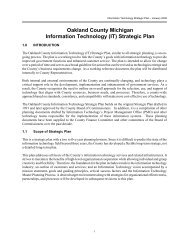Motion for Summary Judgment - Oakland County
Motion for Summary Judgment - Oakland County
Motion for Summary Judgment - Oakland County
Create successful ePaper yourself
Turn your PDF publications into a flip-book with our unique Google optimized e-Paper software.
2:11-cv-12666-VAR-LJM Doc # 63 Filed 03/23/12 Pg 1 of 16 Pg ID 774<br />
OAKLAND COUNTY, ET AL.,<br />
Plaintiffs,<br />
UNITED STATES DISTRICT COURT<br />
EASTERN DISTRICT OF MICHIGAN<br />
SOUTHERN DIVISION<br />
vs Case No: 11-12666<br />
Honorable Victoria A. Roberts<br />
FEDERAL HOUSING FINANCE AGENCY<br />
AS CONSERVATOR FOR FEDERAL<br />
NATIONAL MORTGAGE ASSOCIATION AND<br />
FEDERAL HOME LOAN MORTGAGE COMPANY;<br />
FEDERAL NATIONAL MORTGAGE ASSOCIATION;<br />
AND FEDERAL HOME LOAN MORTGAGE COMPANY,<br />
Defendants.<br />
________________________________/<br />
ORDER GRANTING PLAINTIFFS’ MOTION FOR SUMMARY JUDGMENT AND<br />
DENYING DEFENDANTS’ MOTION FOR SUMMARY JUDGMENT<br />
I. INTRODUCTION<br />
This matter is be<strong>for</strong>e the Court on cross-motions <strong>for</strong> summary judgment filed, on<br />
the one hand, by Plaintiffs <strong>Oakland</strong> <strong>County</strong> and Andrew E. Meisner, <strong>Oakland</strong> <strong>County</strong><br />
Treasurer (“Plaintiffs”), Intervenor-Plaintiffs the Michigan Department of Attorney<br />
General and the Michigan Department of Treasury (“State Plaintiffs”), and, on the other<br />
hand, by Defendants the Federal National Mortgage Association (“Fannie Mae”), the<br />
Federal Home Loan Mortgage Corporation (“Freddie Mac”)(together, the “Enterprises”),<br />
and Intervenor-Defendant Federal Housing Finance Agency (“FHFA” or “Conservator,”<br />
and, together with the Enterprises, “Defendants”).<br />
Plaintiffs claim that Defendants failed to pay the Michigan real estate transfer tax<br />
1
2:11-cv-12666-VAR-LJM Doc # 63 Filed 03/23/12 Pg 2 of 16 Pg ID 775<br />
when they conveyed property in <strong>Oakland</strong> <strong>County</strong>. They seek a judgment that<br />
Defendants are liable <strong>for</strong> unpaid taxes in an amount to be determined. Defendants<br />
claim they are exempt from the tax.<br />
Oral argument was heard on February 10, 2012.<br />
For the reasons that follow, Plaintiffs’ and State Plaintiffs’ motions <strong>for</strong> summary<br />
judgment are GRANTED. Defendants’ motion <strong>for</strong> summary judgment is DENIED.<br />
II.<br />
BACKGROUND<br />
This case involves the Enterprises’ claimed exemption from the Michigan State<br />
Real Estate Transfer Tax, MCL § 207.521 et seq., and the <strong>County</strong> Real Estate Transfer<br />
Tax, MCL § 207.501 et seq. (the “Transfer Taxes”). The statutes impose a tax by the<br />
State of $7.50 per $1,000 in value on the property sold, and by the <strong>County</strong> of $1.10 per<br />
$1,000. Id. §§ 502, 523. These taxes are not taxes on real property; rather, they are<br />
excise taxes (not direct taxes), paid on the recording of deeds, when ownership of<br />
property is transferred. An “excise tax” is a tax levied upon the use and transfer of<br />
property.<br />
Congress chartered the Enterprises to “establish secondary market facilities <strong>for</strong><br />
residential mortgages,” to “provide stability in the secondary market <strong>for</strong> residential<br />
mortgages,” and “to promote access to mortgage credit throughout the Nation.” Defs.<br />
Resp. Br., Doc. 40, p.3 (quoting 12 U.S.C. § 1716). Though originally created as<br />
federal entities, both Fannie Mae and Freddie Mac later became private corporations,<br />
which publicly traded. They were required to file reports with the Securities and<br />
Exchange Commission. Pltfs. Br., Doc. 5, p. 1.<br />
2
2:11-cv-12666-VAR-LJM Doc # 63 Filed 03/23/12 Pg 3 of 16 Pg ID 776<br />
FHFA is a federal agency created by the Housing Economic Recovery Act of<br />
2008 (“HERA”) to regulate the Enterprises. 12 U.S.C. § 4501 et seq. On September 6,<br />
2008, the Director of FHFA placed the Enterprises into FHFA’s conservatorship “<strong>for</strong> the<br />
purpose of reorganizing, rehabilitating or winding up [their] affairs.” Defs. Resp. Br.,<br />
Doc. 40., p.4 (quoting 12 U.S.C. § 4617(a)(2)). FHFA, as Conservator, “‘immediately<br />
succeed[ed] to . . . all rights, titles, powers, and privileges of [the Enterprises], and of<br />
any stockholder, officer, or director of [the Enterprises]’” and all rights (i) to the assets of<br />
the Enterprises; (ii) to collect all obligations and money due the Enterprises; (iii) to<br />
per<strong>for</strong>m all functions of the Enterprises, in their name, consistent with appointment of<br />
the Conservator; and (iv) to exercise such incidental powers as may be necessary to<br />
carry out all powers and authorities specifically granted.” Id. (citing 12 U.S.C. §§<br />
4617(b)(2)(A), (B), (J)).<br />
The Enterprises own a large number of mortgages in <strong>Oakland</strong> <strong>County</strong> and<br />
throughout the country. As mortgages become delinquent and properties enter into<br />
<strong>for</strong>eclosure, the Enterprises take ownership of the properties and attempt to locate<br />
buyers. Once the Enterprises locate a buyer <strong>for</strong> a <strong>for</strong>eclosed property, they convey the<br />
property and record the deed. When the Enterprises present the deed <strong>for</strong> recording,<br />
they do not pay the transfer tax; they claim they are exempt under state law or federal<br />
law, or both, because transfer taxes are taxes on them as corporations.<br />
During the <strong>for</strong>eclosure crisis of the past several years, the number of properties<br />
the Enterprises took ownership of ballooned. The Enterprises’ potential transfer tax<br />
liability increased accordingly. <strong>Oakland</strong> <strong>County</strong> alone claims the Enterprises owe it in<br />
excess of millions of dollars.<br />
3
2:11-cv-12666-VAR-LJM Doc # 63 Filed 03/23/12 Pg 4 of 16 Pg ID 777<br />
Plaintiffs filed suit against the Enterprises on June 20, 2011. On July 20, 2011,<br />
FHFA moved to intervene as defendant; Magistrate Judge Michelson granted the<br />
motion on September 20, 2011. On November 10, 2011, the State Plaintiffs moved to<br />
intervene; the parties stipulated to the intervention on November 23, 2011. Plaintiffs<br />
and State Plaintiffs filed separate motions <strong>for</strong> summary judgment raising substantially<br />
the same arguments. Defendants filed joint responses and cross-motions <strong>for</strong> summary<br />
judgment.<br />
Plaintiffs allege that the Enterprises are liable <strong>for</strong> the Transfer Taxes because<br />
they are private corporations, not federal entities, and because their federal statutory<br />
exemptions from certain taxes do not include the Transfer Taxes. Plaintiffs say that the<br />
Supreme Court has long interpreted an exemption from “all taxation” to cover only direct<br />
taxation, not excise taxes such as the Transfer Taxes. Defendants respond that federal<br />
statutes granting them immunity from “all taxation” exempt them from payment of<br />
Transfer Taxes. Defendants further argue that their status as private entities or federal<br />
instrumentalities is irrelevant since Congress expressly exempted them from “all<br />
taxation.” There<strong>for</strong>e, Defendants say the Court need not decide whether they are<br />
constitutionally immune from all state and local taxation; the Court need only interpret<br />
federal statutes to conclude that they are immune from the Transfer Taxes.<br />
III.<br />
LAW AND ANALYSIS<br />
A. Standard of Review<br />
The Court will grant summary judgment if “the movant shows that there is no<br />
genuine dispute as to any material fact and the movant is entitled to judgment as a<br />
4
2:11-cv-12666-VAR-LJM Doc # 63 Filed 03/23/12 Pg 5 of 16 Pg ID 778<br />
matter of law.” Fed. R. Civ. P. 56(a). When reviewing cross-motions <strong>for</strong> summary<br />
judgment, the court must assess each motion on its own merits. Federal Ins. Co. v.<br />
Hart<strong>for</strong>d Steam Boiler Insp. and Ins. Co., 415 F.3d 487, 493 (6th Cir. 2005). “The<br />
standard of review <strong>for</strong> cross-motions <strong>for</strong> summary judgment does not differ from the<br />
standard applied when a motion is filed by only one party to the litigation.” Lee v. City of<br />
Columbus, 636 F.3d 245, 249 (6th Cir. 2011). “[T]he filing of cross-motions <strong>for</strong><br />
summary judgment does not necessarily mean that an award of summary judgment is<br />
appropriate.” Spectrum Health Continuing Care Group v. Anna Marie Bowling<br />
Irrevocable Trust, 410 F.3d 304, 309 (6th Cir. 2005). However, summary judgment is<br />
particularly appropriate where “the case turns upon an issue of law, such as the<br />
construction of a statute.” Salazar v. Brown, 940 F.Supp. 160, 161 (W.D. Mich. 1996).<br />
B. Federal Statutes Exempt Defendants from “All Taxation”<br />
The Court begins its analysis by examining the language of the statutory<br />
exemptions Congress granted Defendants. See Gwaltney of Smithfield, Ltd. v.<br />
Chesapeake Bay Found., Inc., 484 U.S. 49. 56 (1989) (“It is well settled that the starting<br />
point <strong>for</strong> interpreting a statute is the language of the statute itself.”).<br />
Fannie Mae’s federal charter provides that:<br />
The corporation, including its franchise, capital, reserves, surplus, mortgages or<br />
other security holdings, and income, shall be exempt from all taxation now or<br />
hereafter imposed by any State, territory, possession, Commonwealth, or<br />
dependency of the United States, or by the District of Columbia, or by any<br />
county, municipality, or local taxing authority, except that any real property of the<br />
corporation shall be subject to State, territorial, county, municipal, or local<br />
taxation to the same extent as other real property is taxed. 12 U.S.C. §<br />
1723a(c)(2) (emphasis added)<br />
In nearly identical terms, Freddie Mac’s charter states:<br />
5
2:11-cv-12666-VAR-LJM Doc # 63 Filed 03/23/12 Pg 6 of 16 Pg ID 779<br />
The Corporation, including its franchise, activities, capital, reserves, surplus, and<br />
income, shall be exempt from all taxation now or hereafter imposed by any<br />
territory, dependency, or possession of the United States or by any State,<br />
county, municipality, or local taxing authority, except that any real property of the<br />
Corporation shall be subject to State, territorial, county, municipal, or local<br />
taxation to the same extent according to its value as other real property is taxed.<br />
12 U.S.C. § 1452(e) (emphasis added).<br />
Lastly, HERA provides that FHFA:<br />
including its franchise, its capital, reserves, and surplus, and its income, shall be<br />
exempt from all taxation imposed by any State, county, municipality, or local<br />
taxing authority, except that any real property of the Agency shall be subject to<br />
State, territorial, county, municipal, or local taxation to the same extent according<br />
to its value as other real property is taxed . . . 12 U.S.C. § 4617(j)(2) (emphasis<br />
added).<br />
In addition, HERA provides that FHFA, as Conservator, shall not be liable <strong>for</strong> any fines<br />
or penalties “including those arising from the failure of any person to pay any real<br />
property, personal property, probate, or recording tax or any recording or filing fees<br />
when due.” 12 U.S.C. § 4617(j)(4).<br />
The three statutes exempt each of the Defendants (the Corporations) from “all<br />
taxation” by state and local governments. However, distinctions are drawn between the<br />
corporations and their real property; their real property holdings are subject to a direct<br />
tax. The statutes are broadly worded, and their language is clear and unambiguous.<br />
The parties are largely in agreement on the interpretation of the three statutes.<br />
First, they agree that the statutes control the outcome of this case. Moreover, they all<br />
agree that the statutes exempt the Corporations from all taxation, but that real property<br />
owned by the Corporations is subject to direct taxation according to the value of the<br />
property. Thus, the parties recognize that the statutes treat the Corporations separately<br />
from their real property holdings. In addition, the parties agree that transfer taxes are<br />
6
2:11-cv-12666-VAR-LJM Doc # 63 Filed 03/23/12 Pg 7 of 16 Pg ID 780<br />
excise taxes, not taxes on real property. There<strong>for</strong>e, the Transfer Taxes do not fit into<br />
the exception in the statutes <strong>for</strong> real property.<br />
The sole point of disagreement is over the interpretation of “all taxation.” If<br />
Plaintiffs are to prevail, the Court must find that “all taxation” does not encompass<br />
Transfer Taxes.<br />
C. The Nature of Transfer Taxes<br />
The parties agree that the Transfer Taxes are excise taxes, not direct taxes.<br />
Courts treat excise taxes, such as transfer taxes, differently from direct taxes. Since<br />
this case ultimately turns on this distinction, it is instructive to first examine the nature of<br />
transfer taxes.<br />
A transfer tax is a <strong>for</strong>m of excise tax. The Supreme Court defined an excise tax<br />
as one “which is levied upon the use or transfer of property, even though it might be<br />
measured by the property’s value.” United States v. Wells Fargo Bank, 485 U.S. 351,<br />
355 (1988). The Court compared this with a direct tax, which is “a tax levied upon the<br />
property itself.” Id. In finding that the City of Detroit income tax was an excise, the<br />
Michigan Supreme Court defined an excise as “a tax imposed upon the per<strong>for</strong>mance of<br />
an act, the engaging in an occupation, or the enjoyment of a privilege.” Dooley v. City<br />
of Detroit, 121 N.W.2d 724, 729 (Mich. 1963); see also 71 AM JUR.2d State and Local<br />
Taxation § 24 (2012) (“An excise tax is any tax which does not fall within the<br />
classification of a poll tax or a property tax, and which embraces every <strong>for</strong>m of burden<br />
not laid directly upon persons or property.”).<br />
Numerous courts have held that transfer taxes, like the ones at issue here, are<br />
excise taxes. See, e.g., Coolidge v. Long, 282 U.S. 582, 608 (1931) (a “transfer tax” is<br />
7
2:11-cv-12666-VAR-LJM Doc # 63 Filed 03/23/12 Pg 8 of 16 Pg ID 781<br />
“an excise on the privilege of transmission” of property rights); Berry v. Kavanagh, 137<br />
F.2d 574, 575 (6 th Cir. 1943) (federal “transfer tax measured by the consideration paid<br />
or agreed to be paid” is “an excise upon the privilege of selling lands, tenements or<br />
other realty. The burden of the tax attaches when the property is sold.”); Steven v.<br />
Comm’r of Internal Revenue, No. 5497-03S, 2004 WL 1663400 at *3 (U.S. Tax Ct. July<br />
27, 2004) (“[T]his Court has held on several occasions that so-called transaction<br />
privileges taxes concerning the transfer of property are not deductible [<strong>for</strong> federal<br />
income tax purposes] because such taxes are not imposed on interests in property.”).<br />
The Michigan Transfer Taxes are excise taxes: they are taxes on the act of<br />
transferring the property, not on the property itself. The taxes are implicated only when<br />
property is conveyed, and a deed is recorded. See MCL §§ 207.502, 207.523.<br />
Because the Transfer Taxes are not taxes on real property, the Court must decide<br />
whether statutes which exempt Defendants from “all taxation,” intend to exempt them<br />
from the payment of Transfer Taxes.<br />
D. An Exemption from All Taxation Covers Only Direct Taxes, Not<br />
Excise Taxes<br />
Plaintiffs rely upon the Supreme Court’s decision in Wells Fargo <strong>for</strong> the<br />
proposition that an exemption from “all taxation” does not cover excise taxes such as<br />
the Michigan Transfer Taxes. 485 U.S. 351. Plaintiffs say that Wells Fargo made clear<br />
that an exemption from all taxation covers only direct taxes, not excise taxes. The<br />
Court agrees.<br />
In Wells Fargo, the Supreme Court considered whether certain items of personal<br />
8
2:11-cv-12666-VAR-LJM Doc # 63 Filed 03/23/12 Pg 9 of 16 Pg ID 782<br />
property–“Project Notes”–were exempt from the federal estate tax. In the late 1930s,<br />
Congress passed the Housing Act, 50 Stat. 888 et seq., which empowered state and<br />
local governments to issue tax-free obligations called Project Notes to finance housing<br />
projects. 485 U.S. at 353. Congress provided that “[Project Notes], including interest<br />
thereon, . . . shall be exempt from all taxation now or hereafter imposed by the United<br />
States.” Id. at 355. Discussing the exemption, the Supreme Court stated:<br />
Well be<strong>for</strong>e the Housing Act was passed, an exemption of property from all<br />
taxation had an understood meaning: the property was exempt from direct<br />
taxation, but certain privileges of ownership, such as the right to transfer the<br />
property, could be taxed. Underlying this doctrine is the distinction between an<br />
excise tax, which is levied upon the use or transfer of property . . . and a tax<br />
levied upon the property itself. The <strong>for</strong>mer has historically been permitted even<br />
where the latter has been constitutionally or statutorily <strong>for</strong>bidden. Id.<br />
After reviewing the case law, the Supreme Court held that the exemption from all<br />
taxation did not exempt the Project Notes from excise taxes such as the estate tax. The<br />
Court noted that where Congress had, on other occasions, exempted property from<br />
estate taxation, it generally referred specifically to the estate tax rather than to “all<br />
taxation.” Id. at 356.<br />
In reaching its conclusion, the Court reviewed over eighty years of Supreme<br />
Court case law holding that excise taxes have historically been permitted, even when<br />
tax on the property has been <strong>for</strong>bidden. In Greiner v. Lewellyn, 258 U.S. 384 (1922),<br />
the Supreme Court held that the federal government could collect federal estate tax on<br />
bonds issued by the State of Pennsylvania, despite the fact that principles of federalism<br />
and dual sovereignty prevented the federal government from imposing a direct tax on<br />
the bonds. Id. at 387. The decision was based on the fact that the estate tax “is a duty<br />
or excise, and not a direct, tax like that on income from municipal bonds.” Id. Similarly,<br />
9
2:11-cv-12666-VAR-LJM Doc # 63 Filed 03/23/12 Pg 10 of 16 Pg ID 783<br />
the Supreme Court held in Murdock v. Ward, 178 U.S. 139, 148 (1900) that a federal<br />
tax exemption on federal bonds did not protect the bonds from inclusion in decedent’s<br />
estate <strong>for</strong> purpose of calculating the estate tax. This decision, too, was based on the<br />
distinction between a direct tax and an excise tax. The Court relied on the fact that “the<br />
tax was not imposed on the property passing under the state laws, but on the right of<br />
transfer by will . . .” Id. at 146.<br />
To help illustrate why excise taxes have historically been deemed permissible --<br />
even where direct taxes are statutorily or constitutionally prohibited -- the Court in<br />
Murdock discussed another type of excise tax, a corporate franchise tax. The Court<br />
noted that even though a state could not tax federal bonds directly, it could tax a<br />
corporation whose property is composed in whole or in part of federal bonds. 178 U.S.<br />
at 147. This is because such tax is imposed “not on specific property, but on the rights<br />
and privileges bestowed by the state.” Id. A state bestows a corporation with the right<br />
to do business in the state, and the state maintains power to regulate corporations;<br />
consequently, the state is free to tax the corporation’s activities within the state.<br />
A third Supreme Court case, United States Trust Co. v. Helvering, 307 U.S. 57<br />
(1939) applied the prior rules announced in Greiner and Murdock to conclude that<br />
statutes exempting federal obligations from “all taxation” referred only to direct taxation.<br />
The issue was whether proceeds of a War Risk Insurance policy that were exempt by<br />
federal statute from “all taxation,” were still subject to the federal estate tax. The Court<br />
held they were because, “[a]n estate tax is not levied upon the property of which an<br />
estate is composed. It is an excise imposed upon the transfer of or shifting in<br />
relationships to property at death.” Id. at 60.<br />
10
2:11-cv-12666-VAR-LJM Doc # 63 Filed 03/23/12 Pg 11 of 16 Pg ID 784<br />
The reasoning in Wells Fargo naturally follows these earlier decisions. The Court<br />
in Wells Fargo recognized that “all taxation” had an understood meaning, and that it<br />
applied only to direct taxes, not excise taxes.<br />
Wells Fargo is dispositive of Plaintiff’s case. Like the exemption in Wells Fargo,<br />
the exemptions here exempt Defendants from “all taxation.” The Transfer Taxes, like<br />
the estate tax in Wells Fargo, are excise taxes. The Supreme Court in Wells Fargo<br />
made clear that where a statute prohibits the collection of “all taxation,” an excise tax is<br />
still due “even where the latter [a property tax] has been constitutionally or statutorily<br />
<strong>for</strong>bidden.” Wells Fargo, 485 U.S. at 355. Wells Fargo dictates that Defendants’<br />
statutory exemptions do not cover the Transfer Taxes.<br />
Further, Wells Fargo states that “exemptions from taxation are not to be implied;<br />
they must be unambiguously proved.” 485 U.S. at 354. Despite the presumption<br />
against implied exemptions, the Supreme Court still found that “all taxation”<br />
unambiguously did not include excise taxes. Because there is a presumption against<br />
implied tax exemptions, and “all taxation” has been implied to mean “direction taxation,”<br />
and the Michigan Transfer Taxes are an excise tax rather than a direct tax, Defendants<br />
are unambiguously liable <strong>for</strong> the Transfer Taxes.<br />
Defendants maintain that Wells Fargo is inapposite because the Supreme Court<br />
there considered an exemption of specific property from all taxation; here, the Court<br />
must consider whether entire corporations are exempt. The Court believes this does<br />
not make a difference. Wells Fargo is a case about the understood and longestablished<br />
meaning of “all taxation,” the same statutory language in Defendants’<br />
exemptions. Moreover, the cases Defendants cite in support of their theory that the<br />
11
2:11-cv-12666-VAR-LJM Doc # 63 Filed 03/23/12 Pg 12 of 16 Pg ID 785<br />
Enterprises were granted broad entity exemptions are distinguishable.<br />
Defendants’ two most persuasive cases–Laurens and Pittman–involve states’<br />
attempted imposition of a documentary stamp tax on federal financial institutions that<br />
were similarly granted an exemption from “all taxation.” In Laurens Fed. Savings and<br />
Loan Ass’n v. South Carolina Tax Comm’n, 365 U.S. 517 (1961), the Supreme Court<br />
considered a federal statute that exempted a Federal Home Loan Bank (“FHLB”)<br />
“including its franchise, its capital, reserves, and surplus, its advances, and its income”<br />
from “all taxation.” Id. at 519, citing 12 U.S.C. § 1433. The issue was whether<br />
“advances,” or loans, secured by promissory notes, were subject to a state<br />
documentary stamp tax. The Court held that they were not. The Court believed that the<br />
stamp tax, in essence, amounted to a direct tax on the “advances” of the FHLB, and<br />
that advances were an integral part of the loan transactions. Id. at 522. In Pittman v.<br />
Home Owners’ Loan Corp., 308 U.S. 21 (1939), the Supreme Court considered similar<br />
facts and held that a federal mortgage bank was exempt from paying a stamp tax on<br />
mortgages. The Court again implied that the stamp tax was, by its nature, akin to a<br />
direct tax because it was imposed on an “indispensable element[] in the lending<br />
operations authorized by Congress.” Id. at 32. The Court construed the term “loans” in<br />
the exemption to cover the entire lending process, and found that the stamp tax<br />
amounted to an impermissible tax on “loans.”<br />
Michigan Transfer Taxes are imposed on the privilege of doing business, not on<br />
the Enterprises themselves. There<strong>for</strong>e, Laurens and Pittman are inapplicable. The<br />
Transfer Taxes are not imposed on “loans” or “advances” of the Enterprises, but rather<br />
on one of their activities: the transfer of property. Moreover, the loans and advances at<br />
12
2:11-cv-12666-VAR-LJM Doc # 63 Filed 03/23/12 Pg 13 of 16 Pg ID 786<br />
issue in Laurens and Pittman were an indispensable part of the banks’ businesses, and<br />
were expressly authorized by Congress. There is no suggestion that the Michigan<br />
Transfer Taxes affect an indispensable part of the Enterprises’ businesses. Lastly,<br />
although the Supreme Court interpreted federal statutes in Laurens and Pittman,<br />
constitutional immunity bolstered the Court’s reasoning. See, e.g., Pittman, 308 U.S. at<br />
32 (“[T]he activities of the Corporation through which the national government lawfully<br />
acts must be regarded as governmental functions and as entitled to whatever immunity<br />
attaches to those functions when per<strong>for</strong>med by the government itself . . .”). There is no<br />
suggestion here that the Enterprises are constitutionally immune from taxation. Thus,<br />
the suggestion that their activities as corporations are immune is even further<br />
attenuated.<br />
Other cases cited by Defendants are also not on point. In Fed. Land Bank of St.<br />
Paul v. Bismarck Lumber Co., 314 U.S. 95 (1941), the Supreme Court held that a<br />
federal land bank granting a statutory exemption similar to the Enterprises’ was exempt<br />
from state sales tax. The Court relied on the fact that the land bank was constitutionally<br />
immune from taxation due to its status as a federal instrumentality. Id. at 102<br />
(“Congress has the power to protect the instrumentalities which it has constitutionally<br />
created.”). Again, there is no suggestion here that the Enterprises are instrumentalities<br />
of the federal government. Defendants’ took the position that their status as federal<br />
instrumentalities was irrelevant.<br />
In Federal Lank Bank of Wichita v. Board of <strong>County</strong> Commissioners, 368 U.S.<br />
146, 149 (1961), the Supreme Court held that a federal land bank was not subject to<br />
state personal property taxes on its interests in oil and gas leases. The personal<br />
13
2:11-cv-12666-VAR-LJM Doc # 63 Filed 03/23/12 Pg 14 of 16 Pg ID 787<br />
property tax at issue was a direct tax. This case does not affect the Court’s analysis<br />
regarding the Transfer Taxes. Further, it appears the Court in Wichita relied on<br />
constitutional immunity in reaching its decision. Id. At 149 (“Congress has the power to<br />
determine, within the limits of the Constitution, the extent that its instrumentalities shall<br />
enjoy immunity from state taxation.”) (emphasis added). Defendants have never argued<br />
that the Enterprises are federal instrumentalities.<br />
In the end, this case turns on the interpretation of “all taxation.” Wells Fargo held<br />
that all taxation means all direct taxation, not excise taxation. Defendants’ cases do not<br />
change this analysis . Because the Michigan Transfer Taxes are excise taxes,<br />
Defendants are liable.<br />
E. The Michigan Exemption<br />
Plaintiffs also seek a ruling that Defendants are not exempt under a Michigan law<br />
which exempts government entities from taxation. Defendants argued that the Court<br />
need not reach this issue, since they said they were exempt under the federal<br />
exemption, and that the federal exemption controlled by way of the Supremacy Clause<br />
of the Constitution. Defendants did not address the state law exemption in their briefs,<br />
or at oral argument. Because the Court found that Defendants are not exempt under<br />
the federal statutes, it will briefly address the Michigan exemption.<br />
it is:<br />
The Michigan exemption states that a deed is exempt from the Transfer Taxes if<br />
A written instrument in which the grantor is the United States, this state, a<br />
political subdivision or municipality of this state, or an officer fo the United States<br />
or of this state, or a political subdivision or municipality of this state, acting in his<br />
or her official capacity. M.C.L. § 207.523.<br />
14
2:11-cv-12666-VAR-LJM Doc # 63 Filed 03/23/12 Pg 15 of 16 Pg ID 788<br />
Defendants have repeatedly maintained that their status as federal instrumentalities is<br />
irrelevant. They did not argue at any point that they are federal instrumentalities. A<br />
recent case from the District of Nevada held that Fannie Mae is not a federal<br />
instrumentality <strong>for</strong> tax purposes. See Nevada v. Countrywide Home Loans, 812<br />
F.Supp. 2d 1211, 1216-18 (D. Nev. Sept. 16, 2011). The Court relied on the fact that<br />
Fannie Mae is “essentially a privately owned mortgage banker.” Id. at 1217.<br />
The Enterprises are not federal instrumentalities; they are not exempt under the<br />
Michigan statute.<br />
IV.<br />
CONCLUSION<br />
In the end, this case turns on a single question: whether a statutory exemption<br />
from “all taxation” includes excise taxes such as the Michigan Transfer Taxes. Wells<br />
Fargo dictates that it does not. Accordingly, the Enterprises are liable <strong>for</strong> the Transfer<br />
Taxes.<br />
Plaintiffs’ and State Plaintiff’s motion <strong>for</strong> summary judgment is GRANTED.<br />
Defendants’ motion is DENIED. The issue of damages remains.<br />
IT IS ORDERED.<br />
Dated: March 23, 2012<br />
S/Victoria A. Roberts<br />
Victoria A. Roberts<br />
United States District Judge<br />
15
2:11-cv-12666-VAR-LJM Doc # 63 Filed 03/23/12 Pg 16 of 16 Pg ID 789<br />
The undersigned certifies that a copy of this<br />
document was served on the attorneys of<br />
record by electronic means or U.S. Mail on<br />
March 23, 2012.<br />
S/Linda Vertriest<br />
Deputy Clerk<br />
16


